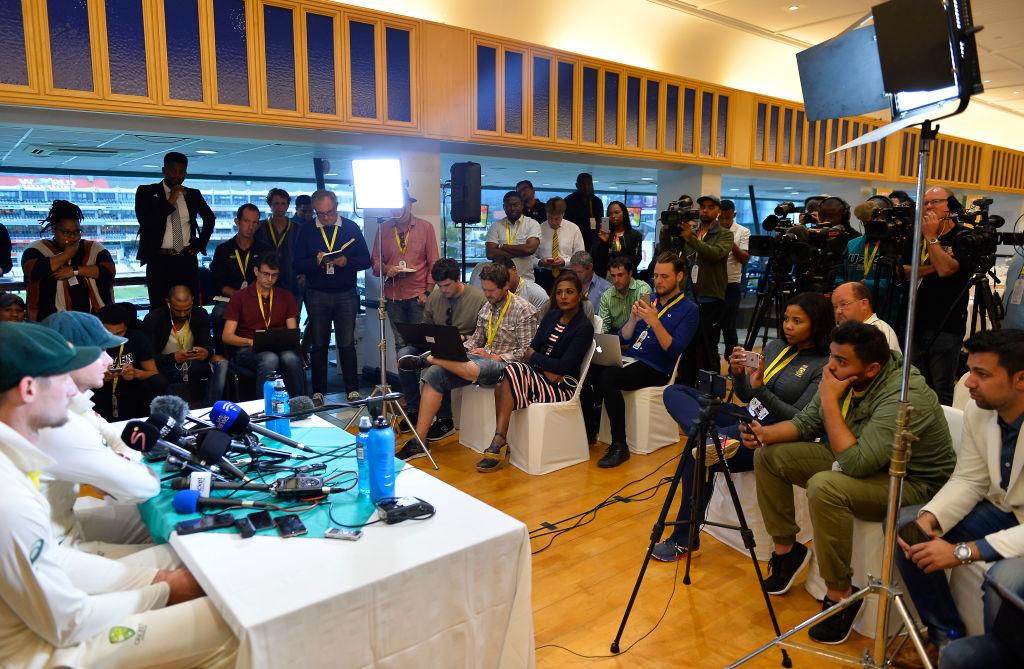To err is human, to forgive divine … but waging a PR campaign to make nice after you’ve scraped the bottom of the morality barrel is conduct unbecoming for a professional sportsman, and especially for a Test cricketer, writes SIMON LEWIS.
The year 2018 saw some incredible cricket in the red and white ball arenas, but it will forever be remembered for the Sandpapergate scandal that erupted in the third Test between South Africa and Australia at Newlands.
Cameron Bancroft was the man who played ‘hide the sandpaper’ on the outfield at Newlands (one of the world’s most beautiful cricket grounds), and although he was ‘pushed’ into using sandpaper on the ball by David Warner – while skipper Steve Smith reportedly turned a blind eye to their plans – Bancroft was still the man who did the unthinkable.
He committed the cricketing crime of the century (excluding match-fixing and related diseases).
READ ALSO: Bancroft fails on return after ban
Bancroft’s nine-month ban has just ended and he was drafted immediately into the Perth Scorchers’ XI to play the Hobart Hurricanes in a Big Bash League clash, scoring only two runs in his comeback match.
A few days before his comeback match an exclusive interview between Bancroft and former Aussie legend Adam Gilchrist was broadcast by Fox Cricket during the first day’s play in the Boxing Day Test between Australia and India.
READ Read the full transcript of the interview here
I’ve personally felt sympathy for Bancroft over the course of the past nine months. A young man among some tough, seasoned Aussie cricketers, misguided, misdirected … and if you watch his face again during the press conference it’s hard not to feel sorry for him.
The worst moment for me from that press conference was when Steve Smith – Aussie skipper, leader of men, turner of blind eyes – pushed young Bancroft (below) directly into the media traffic as the world’s cricketing journos fired up the grill.
‘Do you want to explain?’ said Smith, handing the hot potato over to the young batter. Nice one!
While I initially felt great sympathy for Bancroft regarding his part in Sandpapergate (albeit that he was insanely stupid and weak-willed), I must admit that having watched his recent interview with Gilchrist, I no longer have that much sympathy left for him.
Part of this is a result of my interpretation of some of his answers to Gilchrist’s questions, but it was also the irritation factor that he (and Adam Gilchrist) took part in such a staged and manipulated PR sideshow. Over time one can learn forgiveness for almost anything, but the ‘offender’ should be showing signs of improvement to warrant forgiveness. In my mind, the Australian cricket community that is ‘behind’ the banned trio just seem to be digging a hole that gets deeper and deeper.
READ ALSO: Bancroft has ‘buried David Warner’

It does feel harsh to be heavily critical of Bancroft and Gilchrist, as one never truly knows the pressure on individuals to toe the line. However, by his own admission, ‘toeing the line’ is what got Bancroft into this mess in the first place … and if he and Gilchrist conducted their interview without any ‘guidance’ from stakeholders or spin doctors then, to be honest, I’m even more disappointed in both of them.
Problem 1: Adam Gilchrist was the interviewer
Mr Honesty himself. Mr ‘I Walk When I Knick It’. You know that the Aussie power that be would want Gilchrist doing the interviewing, as he holds much moral high ground around Australia and the world. However, to my mind it fell flat – it was soft serve PR, not an authentic interview. Gilchrist was far too matey, too easy on the interviewee, not holding Bancroft to account or testing him with tough questions. Heck, towards the end he served up a PR slam dunk for Bancroft.
Gilchrist: ‘It must be frustrating looking around world cricket and you hear everyone say everyone is doing it, and we’ve seen multiple offenders, some individuals who’ve offended multiple times get hit with a feather. Has that been hard to take?’
It sounds like a question you’d ask a victim of a crime, not the perpetrator.
From speaking to some Australians, the backlash Down Under has clearly been severe, and the Aussie public at large isn’t likely to turn the other cheek as quickly as Gilly seemed to do with Bancroft. The interview left me feeling cold about both players, which is not at all how I was feeling before I watched the interview.
READ ALSO: Ponting: Bancroft has done more damage
Problem 2: Bancroft turned the mirror on the public
When you’re caught red-handed the thing to do is to admit, apologise, repent, shut up and then humbly return … when you’re allowed to or when you’re welcomed back. If you’re stuck with a label, then so be it. That’s the life of the rich and famous. A schoolkid does something stupid and they’ll be branded with that brush by their classmates until they’re 80 years old, and beyond.
You only have to look at the spate of celebrities caught up in the #MeToo revelations to realise that flagrantly bad actions will follow a person for the rest of their lives. This happens in sport, art, politics and each of our personal lives.
Yet Mr Bancroft, the Sultan of Sandpaper, thinks he deserves a free passage through purgatory. Despite all he had admitted, Cameron Bancroft still took the moral high ground during the interview. I kid you not.
‘There’s people out there who are forever going to look at me and say “he’s a cheat, he’s the guy that cheated, he’s a cheater” and point the finger and be really, really serious about it, I know there’s going to be people like that forever,’ said Bancroft, continuing shortly thereafter that ‘It made me have compassion for someone … my mistake probably triggered a lot of stuff in their life … I almost feel like the reasons why they emotionally kind of connect with us is because we’ve got something in our own life that actually we’re not proud of. Maybe it hurts us because we’ve actually done that in some way ourselves.’
When you hear a guilty man trying to make his crime seem more palatable by spinning the mirror around to make us think that our reactions to his crime is a reflection of things we have done wrong in our lives, rather than a reaction to his crime … well, it makes me wonder if he has, after all, learned anything during his nine-month ban.
Humility, I would suspect, has not become ingrained in Bancroft, based on his comments above.
FULL ANALYSIS OF THE BANCROFT INTERVIEW
I’ve put Bancroft’s interview under the microscope and have offered some comments and analysis around certain points he made in the interview here. His comments are all up for interpretation, but this is my interpretation of his words – not to condemn him, but hopefully to inspire readers to look deeper into his words and come up with their own interpretations.
I actually admire Bancroft and respect him as a cricketer and a man, and hope he gets back to top form. Doing that interview would have been tough and he deserves respect for it, but that doesn’t mean we cannot question what he had to say.
I welcome feedback from readers about the Bancroft interview that might offer me a different perspective to my own conclusions, as I am first and foremost a cricket fan trying to make sense of what happened in order for the cricketing world to get back to normal.
Photo: Mike Owen/Getty Images








